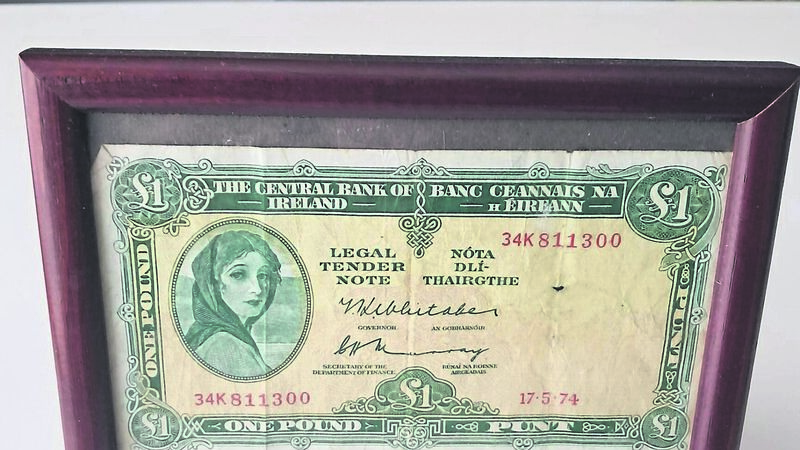Trevor Laffan: The framed punt note that will always remind me of my father

And a trip down memory lane can often be a nice thing.
I have a small, framed photograph at home that I glanced at last week and it set me off. I’ll tell you why.
My father had been a small-time builder all his life and always worked with his hands. He didn’t want it any other way until he was approached by a large construction company during the early 1970s who wanted to employ him as their general manager.
The owner of the company told him he would be required to supervise the various building projects they had underway across the city. He would be well paid, wear a suit and tie, and work normal hours.
For the first time in his life, he wouldn’t have to get his hands dirty.
He knew the owner and they got on well, so he was very tempted. After considering the offer for a few days he decided to go for it.
He didn’t feel comfortable in a suit. It wasn’t practical for him either because he was a man who liked to be hands-on. If he arrived on a building site and there was an issue, he wanted to get stuck in, so the suit had to go. He was back in the overalls, and he was happy.
He got used to the role and was enjoying himself, but it all came to an abrupt end when the owner met with an unfortunate car accident and was killed. The company wound up after that and my father was back on the tools again.
He died in 2010 in his late seventies, but it wasn’t until 2017, when my mother also died, that we cleared out the family home and I came across a work diary of his.
I can’t remember the year of the diary, but I think it was one he was using just a few years or so before his death. While flicking through it, I came across an old 1 pound (punt) note, stuck between the pages.
The note was printed in 1974 and was well flattened. It must have been of some significance but there was no reference to it in the diary.
He must have had it for a while because the euro came into being in January, 1999, and the punt was phased out after that.
Yet he kept that single note in his book and I’m assuming he carried it forward every year when he got a new diary.
I took the note and put it in a small frame and every time I look at it, it gets me thinking.
There was a guy who lived in a large house and was known to be a wealthy character but a bit tight- fisted, and he had a problem. One of his children had hit a small ball onto his roof and it got stuck in the gutter. It was causing the gutter to overflow so he wanted the ball removed.
He had a three-storey house and didn’t have a ladder long enough to reach, so he sent for my father, who had a triple extension set of aluminium ladders. He collected them from his workshop and loaded them onto the roof rack and arrived at the house.
It wasn’t a big job, but it still took a bit of my father’s time. He had to set up the ladders, remove the obstruction in the gutters, take the ladders down again, load them back onto the roof rack, and return them to the workshop. He charged the man a pound.
The man thanked my father and told him he was very grateful. He went into the house and returned a few minutes later with a cheque made out for one pound and handed it to my father.
This amused my father so much that he held onto the cheque for a long time. He often told the story of how he got it, and now I’m wondering if he did eventually cash it and if that pound note represents the proceeds.
He must have had a reason for holding onto it, given he transferred it to a new diary every year.
For the younger generation, the very concept of a cheque book is probably another mystery. Times have changed and the cheque book is a thing of the past for many people.
Looking back on it, it was a cumbersome way of doing business. Prehistoric even, when you compare it to the internet banking we have now, but we didn’t know any better.
Revolut is the preferred method of banking for those of a certain age these days. People’s mobile phone has become the new cheque book, while the rest of us rely on our credit cards.
Paperless banking is the way of things and there is a lot to be said for it. Like it or not, it’s here to stay, but it’s difficult to conjure up a memory by looking at a credit card.







 App?
App?




